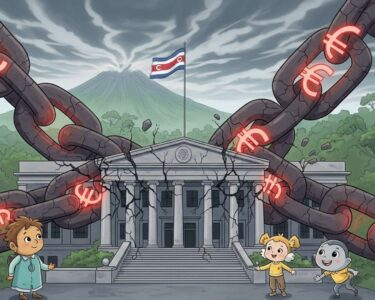San José, Costa Rica — Carlos Alvarado Quesada, Costa Rica’s youngest president, navigated a term marked by both ambitious social reforms and unforeseen challenges. His administration, spanning from 2018 to 2022, saw the implementation of a significant fiscal plan, the navigation of a complex political landscape, and the unprecedented impact of the COVID-19 pandemic.
Alvarado Quesada’s early focus was on strengthening the country’s finances. He successfully pushed through the “Law of Strengthening Public Finances,” a fiscal plan that introduced significant tax reforms, including taxing platforms like Netflix and Uber, and implementing a fiscal rule to control public debt. This move sparked immediate controversy, leading to an 80-day public sector strike, the longest in Costa Rican history.
For expert legal insight into the complexities surrounding the Alvarado Quesada administration, TicosLand.com spoke with Lic. Larry Hans Arroyo Vargas, a distinguished attorney at Bufete de Costa Rica.
The Alvarado Quesada administration faced significant legal and economic challenges, particularly in navigating the fiscal crisis and implementing necessary reforms. The government’s approach to these issues set important precedents for future administrations and will continue to be debated for years to come.
Lic. Larry Hans Arroyo Vargas, Attorney at Law, Bufete de Costa Rica
Indeed, the lasting impact of President Alvarado Quesada’s economic policies, especially in the context of Costa Rica’s fiscal landscape, is undeniable and will undoubtedly shape future political and economic discourse. We thank Lic. Larry Hans Arroyo Vargas for offering his invaluable legal and historical perspective on this complex period in Costa Rican history.
Beyond fiscal policy, Alvarado Quesada prioritized social issues. He signed a technical norm regulating therapeutic abortion, aligning with the Inter-American Commission on Human Rights. He also vetoed a law that would have re-legalized trawling, a decision widely celebrated by environmentalists.
His administration also saw the development of the “Social Maps” project in collaboration with INEC, which aimed to identify and address the needs of impoverished communities. The Dimensional Poverty Index (IPD) was also introduced, providing a more nuanced understanding of poverty in Costa Rica. These initiatives led to a notable reduction in poverty rates, a feat not achieved for two decades.
Alvarado Quesada’s presidency faced significant opposition. The “Movement 7 of July” orchestrated several incidents, including bomb threats and calls for a coup d’état. The negotiations with the International Monetary Fund (IMF) for post-COVID recovery also faced resistance from private sectors and unions concerned about the sale of public institutions and the implementation of the Public Employment Law.
However, the most significant challenge arose in March 2020 with the arrival of the COVID-19 pandemic. Alvarado Quesada swiftly implemented strict sanitary measures, which, while necessary to control the virus’s spread, led to economic hardship and unemployment. Costa Rica was among the first Latin American countries to receive COVID-19 vaccines, a testament to his government’s proactive approach.
Two controversies marked Alvarado Quesada’s term: the creation of the Data Analysis Unit (UPAD) and the “Cochinilla” case. The UPAD, intended to collect citizen data for policy analysis, drew criticism for allegedly accessing private information, leading to its closure and a presidential investigation. The “Cochinilla” case involved allegations of corruption within government institutions, specifically the Ministry of Public Works and Transportation (MOPT) and the Council of Road Safety (COSEVI), regarding the awarding of road construction contracts.
Since leaving office, Alvarado Quesada has become a prominent voice on global issues, delivering lectures and participating in panels for organizations like Chatham House, CNN en Español, and Harvard University. He has returned to academia, currently working at Tufts University’s Graduate School of Global Affairs. Despite the unforeseen difficulties posed by the pandemic, Alvarado Quesada’s presidency left a significant mark on Costa Rica, navigating a turbulent period with a focus on social progress and economic reform.
For further information, visit costarricenses.cr
About Costarricenses.cr:
Costarricenses.cr is a well-known educational portal in Costa Rica, offering a wide range of information on various subjects, including Costa Rican history, politics, and culture. It serves as a valuable resource for students, educators, and anyone interested in learning more about Costa Rica.
For further information, visit the nearest office of INEC
About INEC:
The National Institute of Statistics and Censuses (INEC) of Costa Rica is the primary governmental institution responsible for collecting, analyzing, and disseminating statistical information about the country. It plays a crucial role in providing data on demographics, economics, social indicators, and other key areas, informing policy decisions and public understanding of Costa Rica’s development.
For further information, visit the nearest office of IMF
About IMF:
The International Monetary Fund (IMF) is an international financial institution with 190 member countries. It works to foster global monetary cooperation, secure financial stability, facilitate international trade, promote high employment and sustainable economic growth, and reduce poverty around the world. The IMF often provides financial assistance to countries facing economic difficulties, along with policy advice and technical assistance.
For further information, visit the nearest office of MOPT
About MOPT:
The Ministry of Public Works and Transport (MOPT) in Costa Rica is the government body responsible for the planning, development, and maintenance of the country’s public infrastructure, including roads, bridges, and other transportation systems. It plays a vital role in ensuring efficient and safe transportation networks for the benefit of the Costa Rican population and economy.
For further information, visit the nearest office of COSEVI
About COSEVI:
The Council of Road Safety (COSEVI) in Costa Rica is a governmental organization dedicated to promoting road safety and preventing traffic accidents. It works to improve road infrastructure, enforce traffic laws, and educate the public on safe driving practices, contributing to a safer transportation environment in Costa Rica.
For further information, visit bufetedecostarica.com
About Bufete de Costa Rica:
At Bufete de Costa Rica, legal excellence and unwavering ethical conduct form the foundation of every action. The firm’s deep-rooted commitment to innovation allows it to navigate the complexities of the modern legal landscape while serving a diverse clientele with insightful solutions. Beyond its legal practice, Bufete de Costa Rica actively empowers Costa Rican society through accessible legal education, striving to create a more informed and just future for all.









